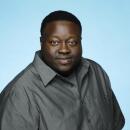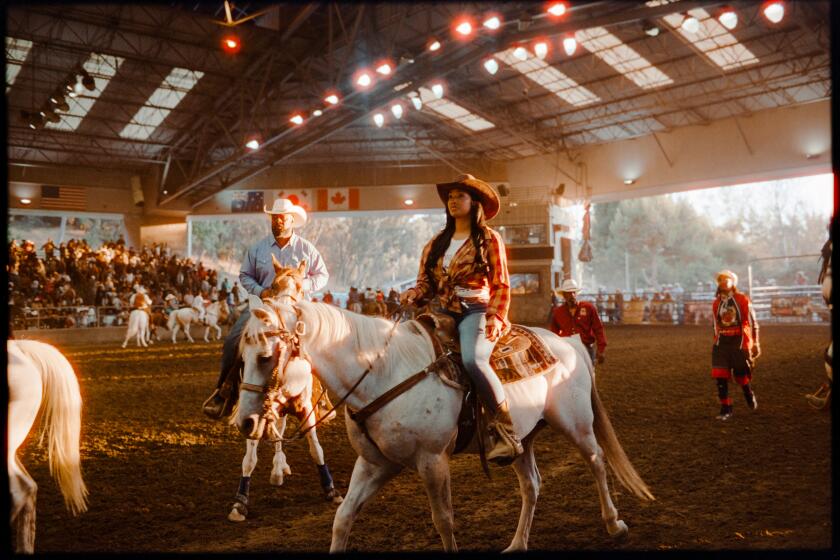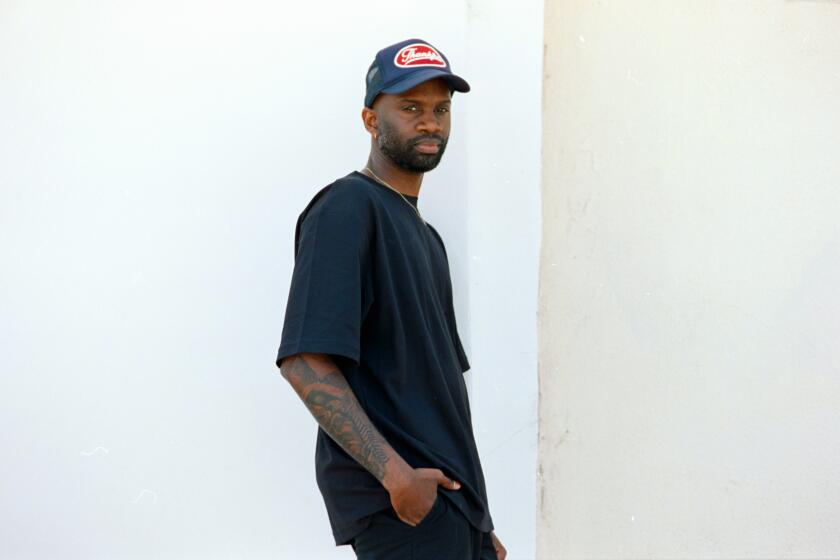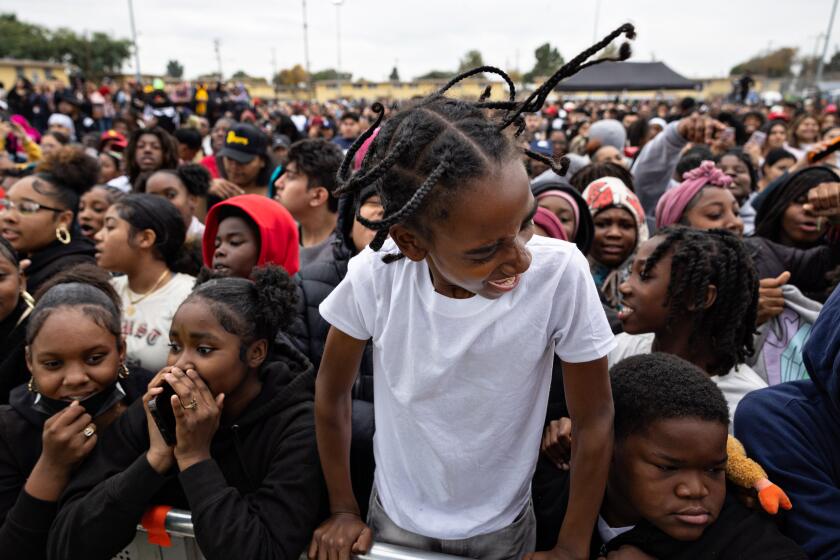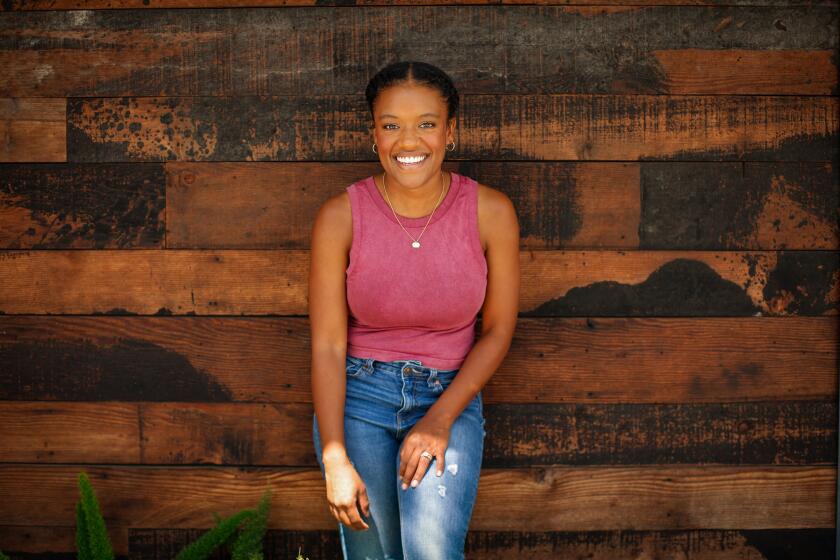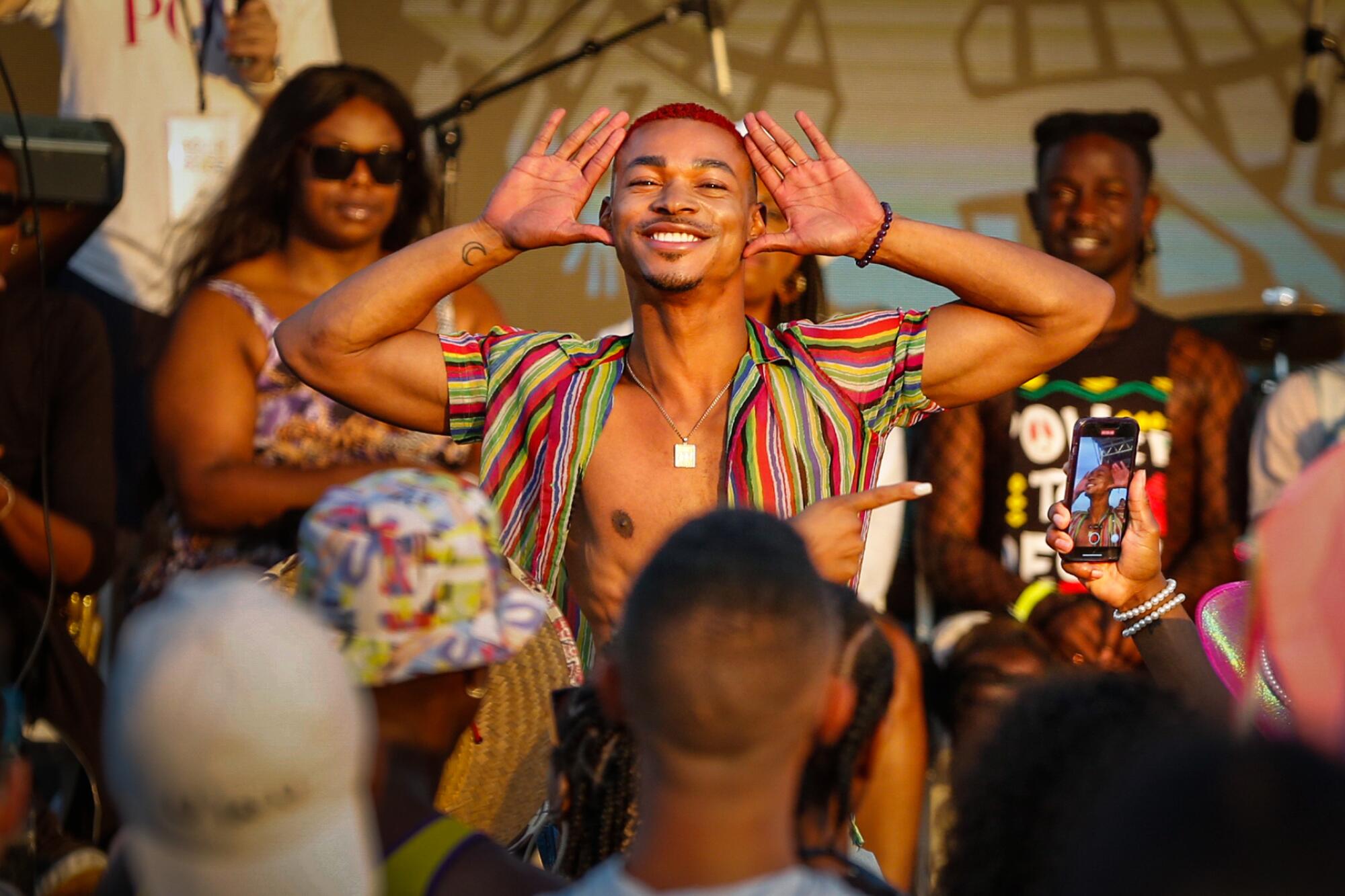
- Share via
Pride celebrations are a reminder of how satisfying it can feel to ditch uniforms of conformity (literal and figurative) and instead let an accurate reflection of our inner selves lead the way. These meaningful moments with community provide sacred nourishment, says L.A.-native Queen Shannon of The Unique Women’s Coalition, who represents the oldest Black trans-led organization in Southern California that provides space, service and programs for the TGI (transgender, gender-diverse, intersex) community. “It brings a sense of family. A lot of us have family voids in our real lives, so to be able to connect and fill that void with community is just as amazing as being connected to your original tribe,” she says.
Sprinkled across the field at Michelle and Barack Obama Sports Complex, South L.A. Pride attendees looked like heart-warming LGBTQ+ art in motion: An elder Black lesbian couple swaying to headliner Durand Bernarr’s set while entangled in each other’s arms. A trans dad holding his daughter as she excitedly claps to music with a head full of colorful barrettes twinkling under the sun. Ease, comfort and high spirits are present, just as Co-Chair Ray Love Jr. and the rest of the South L.A. Pride committee had envisioned.
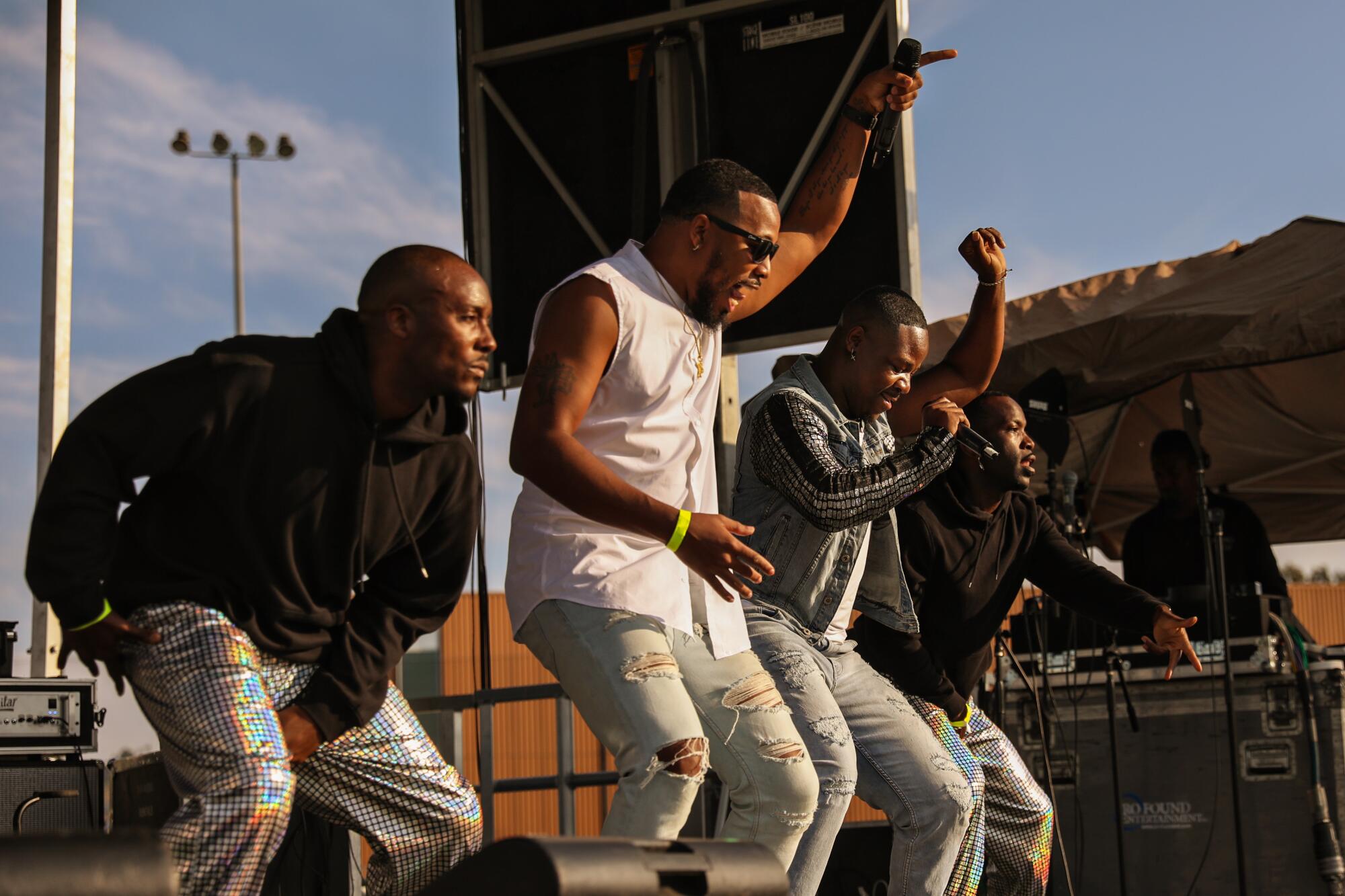
“We were planning this event with the community of South L.A. in mind — every face, every walk of life, every background. We really wanted them to know that we could celebrate ourselves right here in our backyard,” says Love. “What’s been most impactful for me,” he continues, “is seeing the different ways people under the LGBTQ+ umbrella freely express themselves. Their freedom of expression frees me and I just want to be able to put that in front of as many people as I can so that other people can be free too.”
Below, we reflect on a few standout moments and themes from the 2023 South L.A. Pride festival that will remain with us long after the celebration.
Let the true you shine
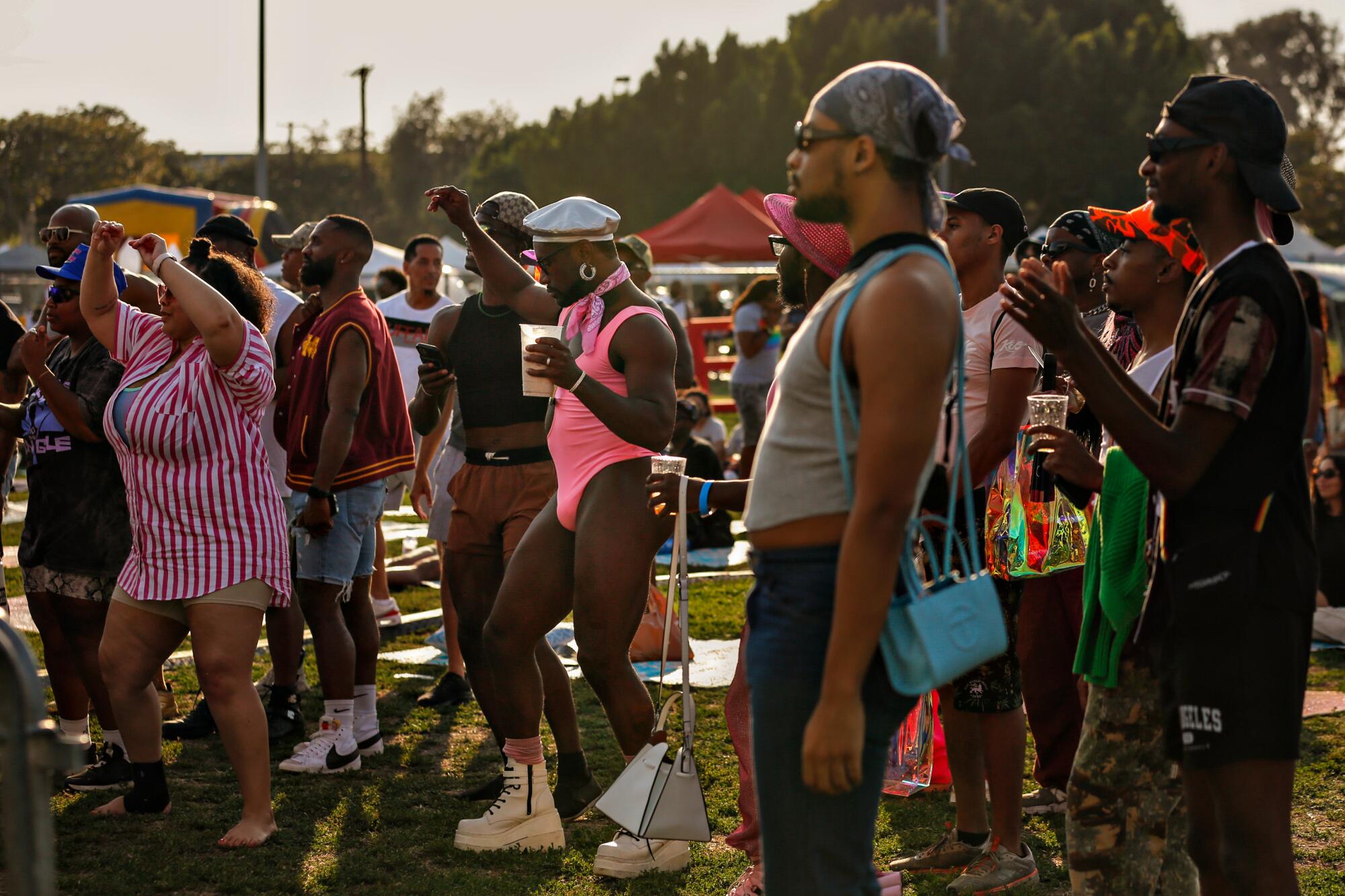
To show up as your full self, regardless of how it clashes with binary views of acceptability is no small feat. Just ask South L.A. Pride attendee Matthew Brinkley, 33, a doctor of psychology and psychotherapist who’s navigated his fair share of buttoned-up spaces in academia and medicine. “When I am my authentic self, it makes me feel that others can be their authentic self — so that’s why I really appreciate being who I am wherever I go,” says Brinkley, donning a hot pink cut-out thong swimsuit with belted flourishes, a metallic silver beret, chunky white platform boots and a mini nonbinary flag in hand. To comfortably stand in his essence alongside community feels validating, he says. “It makes me feel like I belong. It makes me know that there will be other people that understand who I am and I know that they will also appreciate that I see them.”
The youth needs proof
As photographer and Art Mom Project founder Tyra Mitchell once said, “The youth needs proof!” Terrance “TT Got It” Wilson and Pierre Phipps a.k.a. Prince Pierre of the L.A.-based rap duo Freaky Boiz understand this sentiment deeply. “I always say that I love being a possibility model for the youth,” says Wilson, elaborating on the world of possibility that opens up when we see core parts of our identity reflected with care. “There’s no greater reward than doing it for the little Black gay boy who has someone to look up to now because we didn’t have those people to look up to,” says Phipps, recounting a moving past experience where a preteen boy called the duo his heroes after seeing them perform.
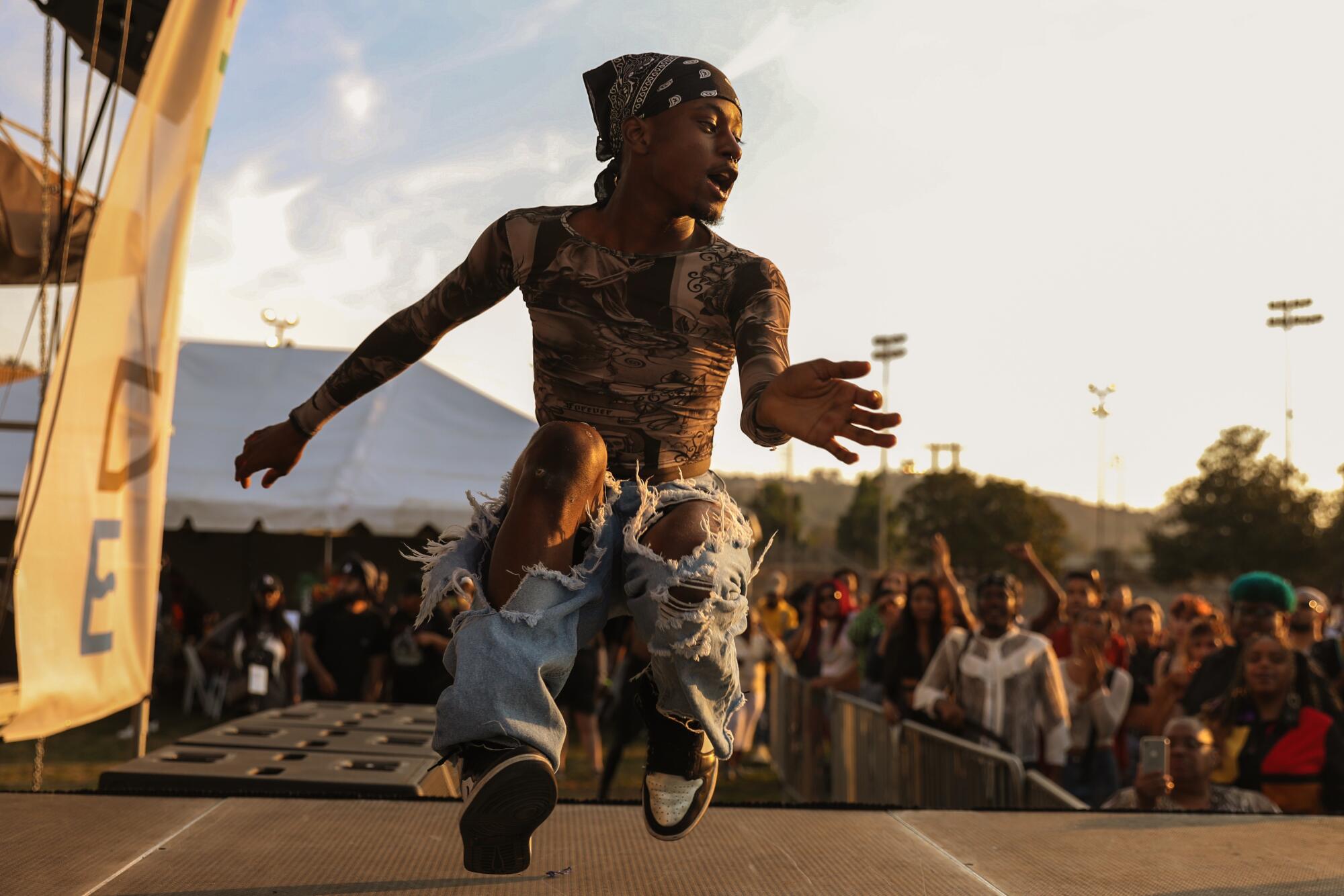
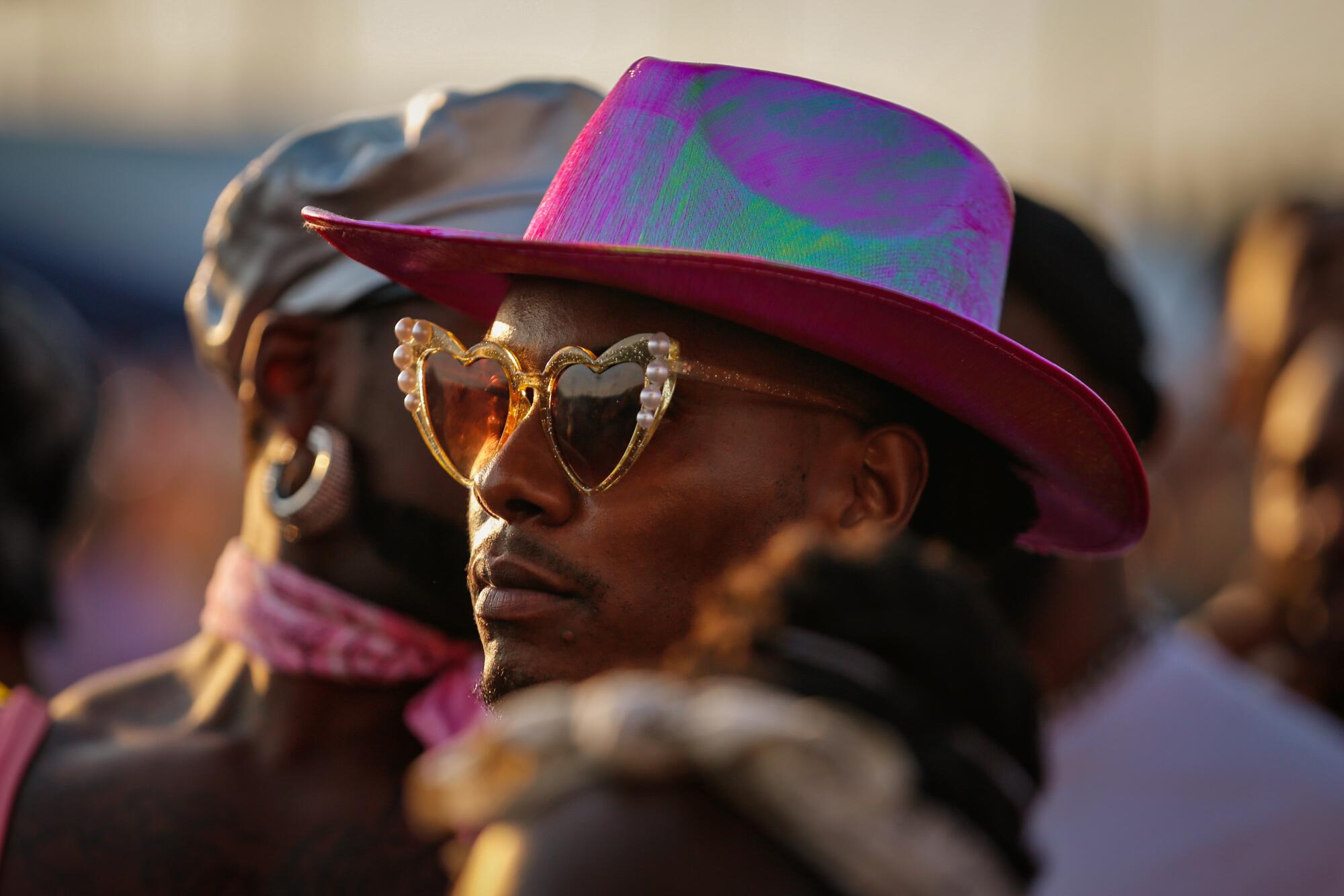
Through the Freaky Boiz’s high-energy live performances and slick raps over instrumentals sure to make you dance, they’re carving their own lane in hip-hop and treating audiences to music that highlights Black gay joy, dating adventures and woes and empowering antiexploitation bops tailor-made for the digital age like “Cash App.”
“They’re trying to teach kids that being gay is wrong and that’s pushing us 50 years backwards from the work of people who started the Pride parade like Marsha P. Johnson and others,” says Wilson. Feeling similarly, Phipps adds that being in community with other LGBTQ+ people has made him feel like he doesn’t have to maneuver life alone. “When we come together like they did at South L.A. Pride and you see all those people celebrating, that’s unstoppable power — and people do not want to see that.”
Joseline Hernandez said it best
Somewhere in the midst of grooving to DJ sets, music performances and watching honorees get recognized for their LGBTQ+ community service efforts, police officers in uniform were welcomed to the stage to say a few words to the crowd about unity! togetherness! etc!. Some watched on in confusion, disappointment, indifference, horror and annoyance. Others weren’t shy about vocalizing their displeasure with loud boos and “No police at Pride!” chants. The noticeable vibe shift as the officers occupied the stage is best summarized by a quote from reality TV it-girl Joseline Hernandez that lives on in the pop cultural lexicon: “Heaux, why is you here?” Like, truly, why?
The Outside Kiki Ball
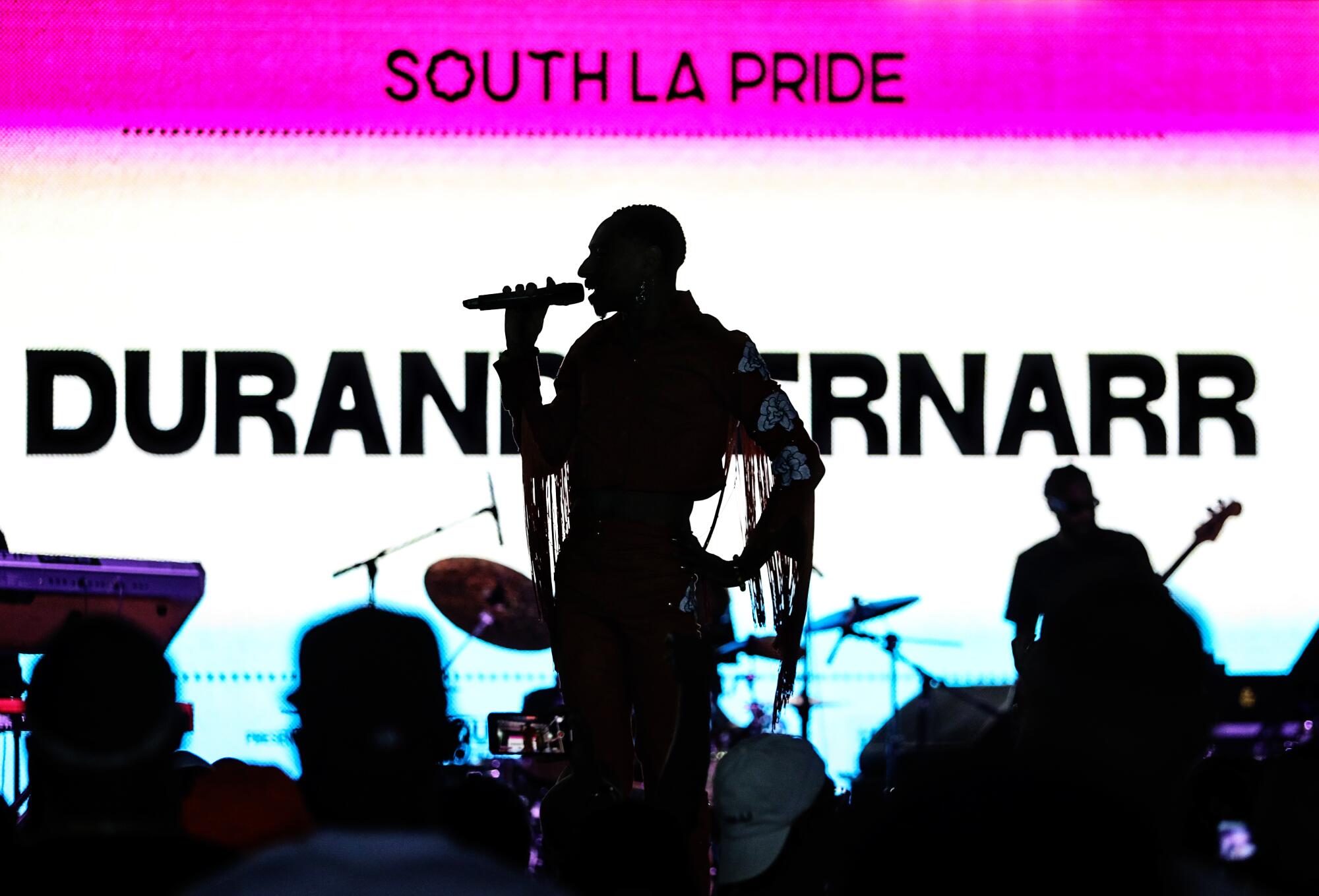
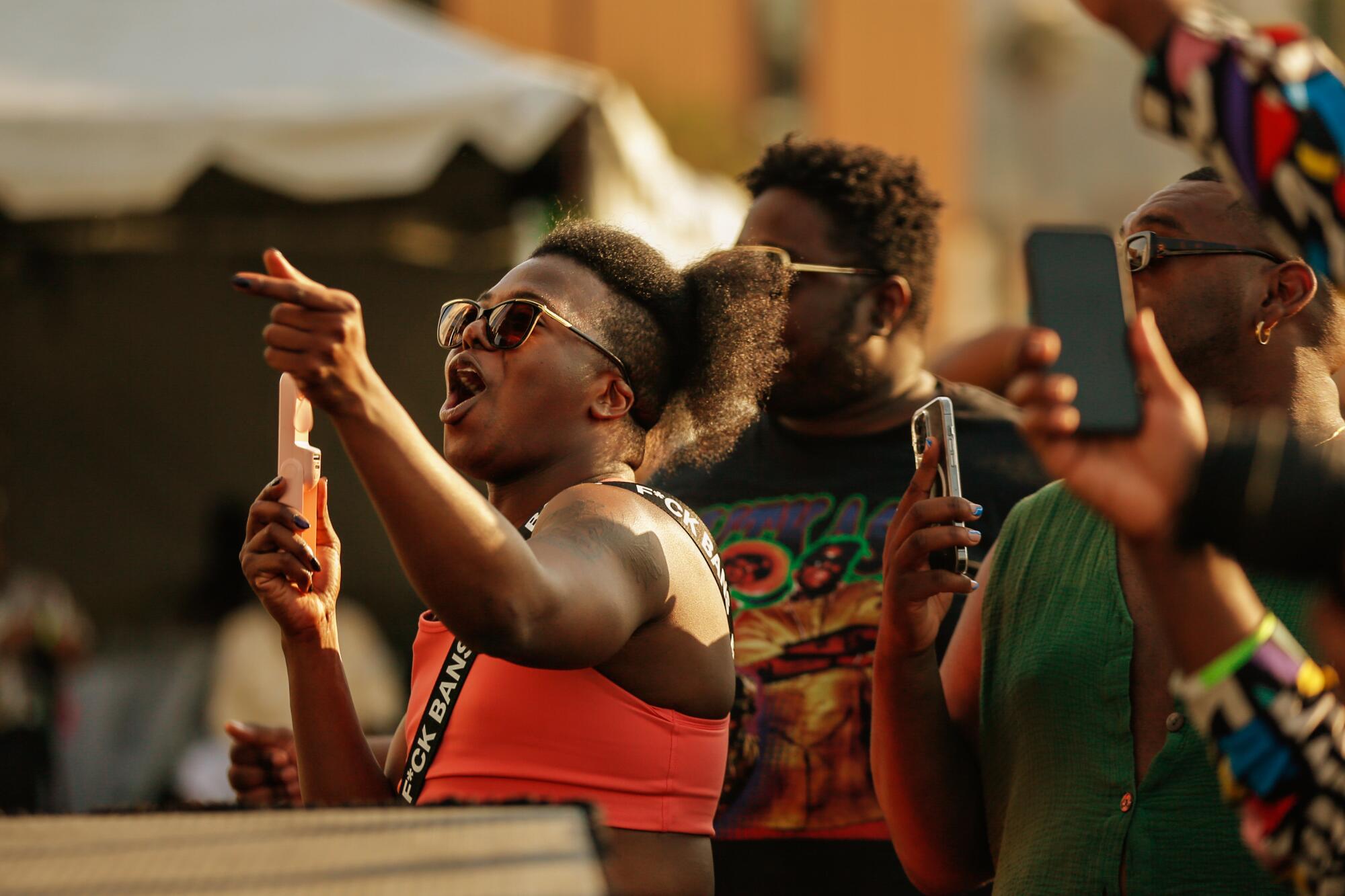
“You can’t throw a ball without ballroom people. Historically, in our community the legends and the icons throw the balls for the community,” says Byron Keaton, widely known by his ballroom name The Ever Legendary Byron Keaton Juicy Couture - Miyake Mugler. As Keaton walks to a quieter place to chat after the successful kiki ball, the adoration people feel toward him is palpable: waves of various people stop him to say hey, give hugs, chit-chat and to ask what the afterparty moves are. He isn’t just known in the community, he’s cherished and trusted by many — which is why he was selected to curate South L.A. Pride’s inaugural outdoor ball.
The emcee of the ball, Torie Amour Balmain and Max’s “Legendary” Season 1 winner, kept the energy up and exemplified why serving as emcee at a ball is an art form in its own right. As participants walked categories like “face,” “realness,” “siren,” “trans masc realness” and more across the stage, thumping ballroom beats worked in tandem with Balmain’s vocal ad-libs — alongside cheers, snaps, claps and dancing. “Nothing comes from nothing. As you enter a room and you [see or hear] ‘there’s an icon on the floor, there’s a legend on the floor,’ clap,” says Keaton, emphasizing the importance of honoring those who come before us. “Give them their roses. Let them smell their flowers while they’re here. Before ballroom was popular, these were the ones who were in the trenches.”
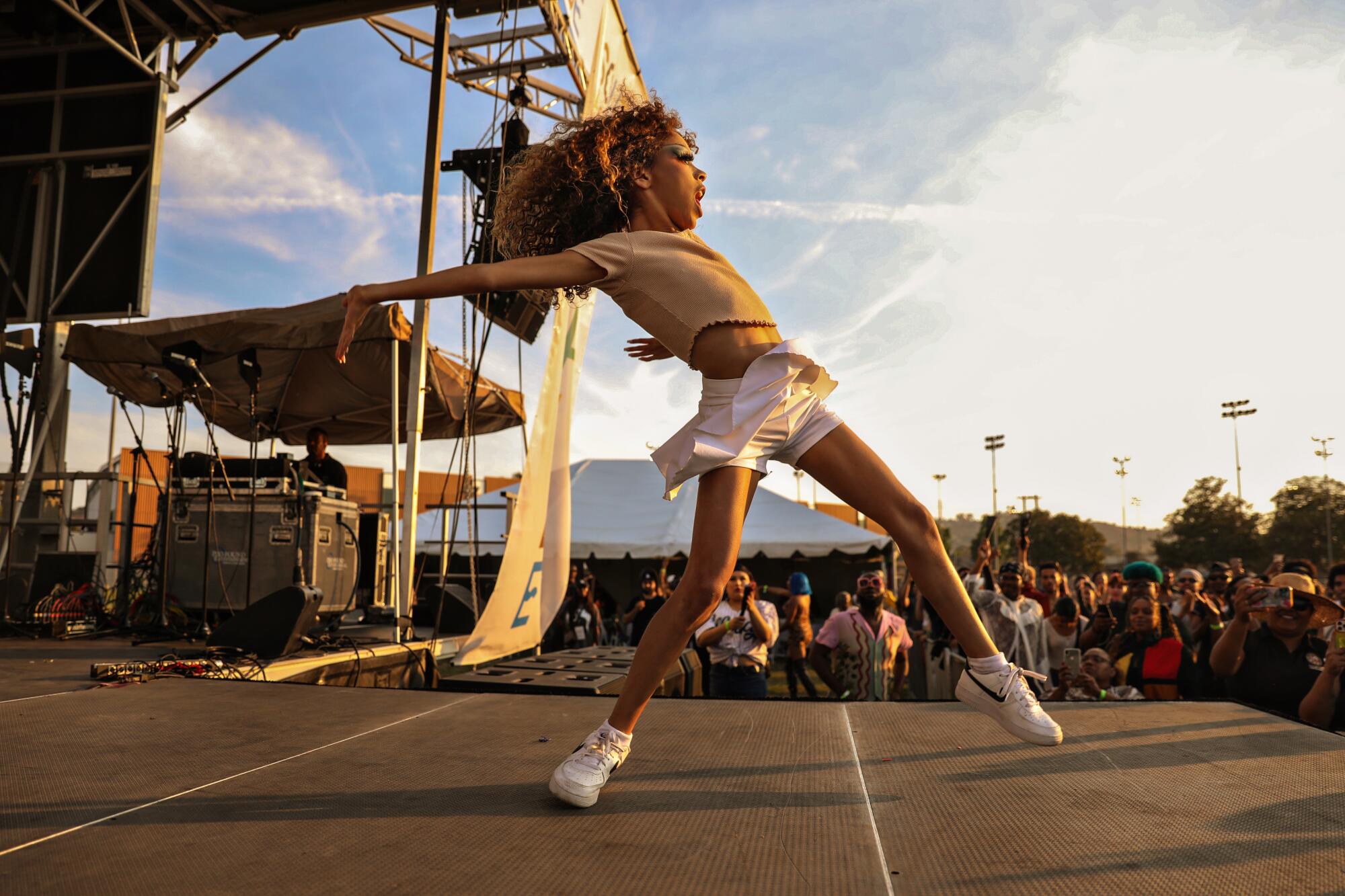
“When I was ascending to my queerness and forging my identity — it was ballroom where I saw so many beautiful expressions of queer people,” says Keaton, reflecting on the rich legacy of the ballroom community. “I feel watered, I feel nourished. That is success for me. That was an epiphany I had before I started curating these balls,” he says, becoming misty eyed. “I’ve been fighting so much for professional success and ascension. Then I looked around and my personal life had been hugely successful this entire time. I’ve always felt loved, I’ve always felt seen, I’ve always felt watered — that’s the queer community for me. They mean so much to me and that’s why I pour into them.”
More to Read
The biggest entertainment stories
Get our big stories about Hollywood, film, television, music, arts, culture and more right in your inbox as soon as they publish.
You may occasionally receive promotional content from the Los Angeles Times.



